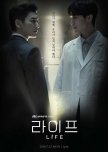This is one of the few K-Dramas in a while that I’ve thoroughly enjoyed without any caveats. One of this drama’s biggest strengths lies in its brilliant casting, with many of the actors, main and supporting, delivering vivid portrayals of their characters. “Life” is a drama that stands out from the crowd not only because of its acting but also because its storyline is consistently strong and impeccably paced. Some reviews have mentioned an issue with pacing (only in a few episodes) but stick with this gem and it rewards you in spades for your loyalty.
I’m often drawn to stories that explore contemporary social issues, especially when those topics include the abuse of power and classism. At the heart of this drama is a power struggle in a hospital between ambitious doctors, many of whom believe ethics shouldn’t be conditional, and a new president with capitalist values. The relationship between both camps is hampered by a difference in values which becomes the running theme of a storyline that sees interests and ideals regularly collide.
One of the more memorable lines in the series which encapsulates this difference is delivered in an exchange between Dr Ye Jin Woo and President Go. In the scene the doctor berates his boss for his apathy, telling him that “hospitals…aren’t the equivalent of expensive sports cars, they aren’t places regular people can’t dream of entering.” I’m not normally a huge fan of medical dramas, but the characters in this series captured my attention. And held it.
I enjoyed the maturity of the storytelling because it’s character driven and doesn’t rely on erecting facile binaries between characters that eclipse their authenticity.
Jo Seung Woo as President Go is particularly memorable for his perfectly understated yet captivating performance. His character arc in the course of the 16 episodes is compelling, (as are his beautiful eyes) particularly as he begins to feel the influence of the doctors’ principled stance and disenchanted with the demands of the corporation he serves. His interactions with Dr Lee No Eul reveal his humanity but also the challenges that come with the position he occupies.
The relationship between Dr Ye Jin Woo and his paraplegic younger brother, Ye Sun-Woo, is the core of this drama and a heart-warming testament to just how wonderful it is to have a supportive sibling in your life. Ye Sun Woo’s determination to challenge the well-intended, but nonetheless annoying, infantalization of his disability is admirable. I enjoyed watching him fight for his independence as his grappled with facing an unresolved childhood trauma.
This drama series exemplifies why I enjoy Korean dramas so much. The acting is so seamless and realistic that it feels more like a feature film than a drama series. Its examination of how prioritising capitalist values can come at the expense of the ethical parts of running a business was totally captivating.
Life is DEFINITELY worth watching.
I’m often drawn to stories that explore contemporary social issues, especially when those topics include the abuse of power and classism. At the heart of this drama is a power struggle in a hospital between ambitious doctors, many of whom believe ethics shouldn’t be conditional, and a new president with capitalist values. The relationship between both camps is hampered by a difference in values which becomes the running theme of a storyline that sees interests and ideals regularly collide.
One of the more memorable lines in the series which encapsulates this difference is delivered in an exchange between Dr Ye Jin Woo and President Go. In the scene the doctor berates his boss for his apathy, telling him that “hospitals…aren’t the equivalent of expensive sports cars, they aren’t places regular people can’t dream of entering.” I’m not normally a huge fan of medical dramas, but the characters in this series captured my attention. And held it.
I enjoyed the maturity of the storytelling because it’s character driven and doesn’t rely on erecting facile binaries between characters that eclipse their authenticity.
Jo Seung Woo as President Go is particularly memorable for his perfectly understated yet captivating performance. His character arc in the course of the 16 episodes is compelling, (as are his beautiful eyes) particularly as he begins to feel the influence of the doctors’ principled stance and disenchanted with the demands of the corporation he serves. His interactions with Dr Lee No Eul reveal his humanity but also the challenges that come with the position he occupies.
The relationship between Dr Ye Jin Woo and his paraplegic younger brother, Ye Sun-Woo, is the core of this drama and a heart-warming testament to just how wonderful it is to have a supportive sibling in your life. Ye Sun Woo’s determination to challenge the well-intended, but nonetheless annoying, infantalization of his disability is admirable. I enjoyed watching him fight for his independence as his grappled with facing an unresolved childhood trauma.
This drama series exemplifies why I enjoy Korean dramas so much. The acting is so seamless and realistic that it feels more like a feature film than a drama series. Its examination of how prioritising capitalist values can come at the expense of the ethical parts of running a business was totally captivating.
Life is DEFINITELY worth watching.
Was this review helpful to you?








